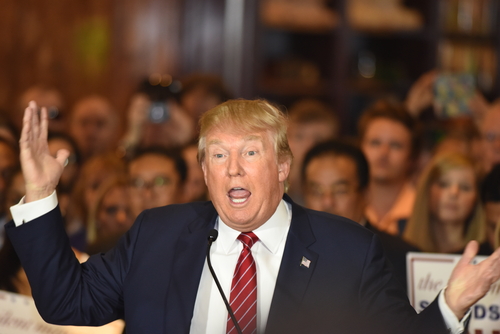Voters in the United States have a demonstrably poor idea of how their government actually works, and we can tell this through how they voted in the 2016 election—but not because Donald Trump, who won the presidency, is a feckless baby-man who says whatever he pleases with no regard for truth. The real reason is that voters clearly don’t understand that they also have to care about branches of government that aren’t under the president’s control if they want anything to happen.
Ironically enough, the person they voted for (thanks to the Electoral College) is doing a wonderful job of illustrating that for them, through slowly learning the lesson for himself. Throughout his campaign, Trump loved to tell people that “[he] alone” could fix our country’s problems, but that’s starkly false whether you support him or not. It’s false because the president leads the executive branch of the United States government, but that office’s power to actually change our country’s laws is relatively limited.
So far, this has resulted in friction between Trump and the legislative and judicial branches, simply because they’ve been actually doing their jobs rather than letting him be our supreme ruler. In court, his travel bans have been legally defeated twice, on the grounds that they’re thinly-veiled attempts to make good on his campaign rhetoric around banning Muslims from entering the United States, which he can’t do no matter how many votes he got. More recently, it was ruled that Trump could not suspend any federal funding from “sanctuary cities” that aren’t helpful in his administration’s actions against undocumented immigrants.
Conservatives loved to complain about President Obama’s use of executive orders, but as it turns out, there’s plenty of room for judges to shoot those orders down if there’s actually something wrong with them.
Meanwhile, on the legislative end in Congress, Trump is having trouble getting anything done, because Congress frequently has trouble getting anything done—especially the current Republican-controlled Congress, whose majority party can’t seem to agree about just how much to screw over their constituents. The “American Health Care Act” that was intended to “replace” (laughably) the Affordable Care Act, which Trump wanted to sign into law but also didn’t want to put his name on (despite that being exactly what signing a bill into law entails), didn’t even make it to a vote before it died. (They’re currently trying again with an even worse version.)
Trump likes to blame obstruction by Democrats for his failures so far, but the AHCA didn’t have enough votes because Republicans couldn’t agree on it, since some of them actually care about their constituents more than keeping ideologically pure with their “small government” rhetoric. Or at least, they care about being reelected.
And that’s the perfect illustration of where everyone, or at least Trump voters, massively screwed up in November. If Trump was supposed to, as his supporters continue to claim, swoop in and bring radical change to government, it probably would’ve been a good idea to change who’s in Congress, where bills are actually written and passed. Instead, even though the entire House of Representatives was up for reelection in 2016, in addition to plenty of Senate seats, Republicans maintained control of Congress—despite Congress’s continually dismal approval ratings.
That likely happened because everyone puts too much emphasis on the importance of the president, which we can also tell by poor voter turnout in “midterm” elections (yep, even worse than the sad voter turnout in presidential election years), held at the two-year midpoint of a president’s term. With the House of Representatives fully up for reelection every two years, as well as individual Senate seats opening up at different times, you’d think people might actually give a crap about voting in every election, but you’d be sadly mistaken. It’s also very much worth mentioning that state and local governments are also important, while everyone seems to think that just voting for one person every four years (and probably that candidate’s party members down the ballot) will do the trick.
“Why don’t they just get onboard with what Trump wants?” That’s not their job. The judicial branch’s job is to uphold the law, which is not up to the president’s whims, and Congress’s job is to do their best for their individual constituents, who often want and need wildly different things.
Trump himself has already owned up to his lack of understanding of how government really works more than once, saying things like, “Nobody knew healthcare could be so complicated.” While it’s easy to point and laugh and say, “Everyone knew that,” clearly everyone does not, and it’s closely related to how they don’t know that government isn’t a matter of the president waving a magic wand. If there is one ray of hope, it’s that Trump voters watching the man they trust so much realize that things are more complicated than they and their facile “common sense solutions” accounted for will finally help them understand that, too.
If we’re going to be stuck with Donald Trump, at least we can hope that his blundering failures teach the important lesson that we need to stop behaving—and voting—as if the president is an all-powerful monarch. Although, it would help if the president would understand that, too.
(image: Shutterstock/a katz)
Want more stories like this? Become a subscriber and support the site!
—The Mary Sue has a strict comment policy that forbids, but is not limited to, personal insults toward anyone, hate speech, and trolling.—









Published: Apr 26, 2017 01:09 pm